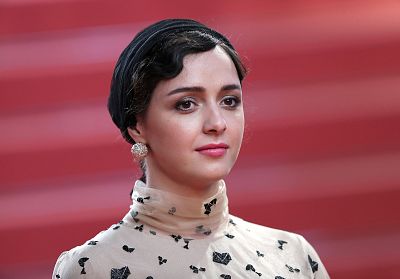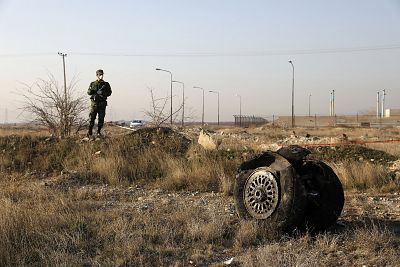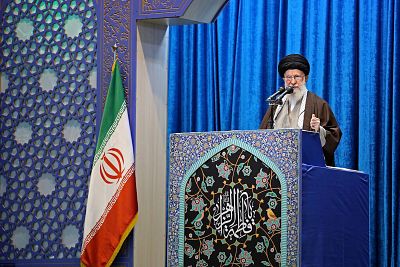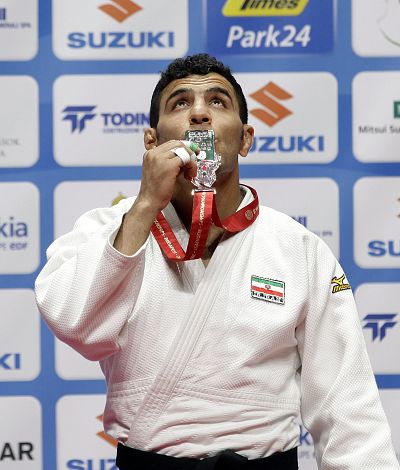"Apologies for lying to you for 13 years," said one state TV host, announcing on Instagram she was quitting.
LONDON — A slew of influential Iranian artists, television personalities and sports stars have publicly broken with Tehran after the government denied for days that it shot downa Ukrainian passenger plane last week.
 ADVERTISEMENT
ADVERTISEMENT
 ADVERTISEMENT
ADVERTISEMENT
"Apologies for lying to you for 13 years," Gelareh Jabbari, a host on the state-run Islamic Republic of Iran Broadcasting TV network, wrote Monday in an Instagram post. The post has since been deleted but was seen by NBC News.
"It was very hard for me to believe our people have been killed, forgive me for believing this late," added Jabbari, the anchor of the lifestyle show, "Good Morning Iran," in an apparent reference to the 82 Iranians who were among the 176 passengers and crew members killed.
Iran initially denied that a missile had struck the plane last Wednesday shortly after it took off from Tehran, the capital, only to reverse course on Saturday and admit that it had shot the plane down by mistake.
Manystudents and middle-class Iranians took to the streets in protest. In Tehran, some students refused to trample on paintings of U.S. and Israeli flags in an apparent rejection of the government's attempts to deflect blame.
Those in more influential positions used their sway to send a message.
Prominent Iranian movie director Masoud Kimiai and popular actors Navid Mohamadzadeh and Taraneh Alidoosti were among several filmmakers, actors and musicians who announced they were boycotting the upcoming Fajr film and theater festivals in the wake of the plane's downing.
In a statement picked up by the liberal newspaper Arman Melli, they were among 14 directors, actors and musicians who offered their condolences to those who lost family members.
According to the newspaper, the statement also criticized the authorities and demanded they explain to the nation the delay in admitting responsibility for shooting the plane down.
Alidoosti, one of Iran's most popular actors who starred in the Oscar-nominated "The Salesman," told her 5.8 million followers on Instagram Sunday that "we are not citizens, we are captives, millions of captives." This Instagram post was also seen by NBC News before being deleted.
The government's handling of the incident has only served to "confirm an existing sense of moral bankruptcy that the Islamic Republic is accused of," said Afshin Shahi, an associate professor in Middle East politics at Bradford University.
"The Islamic Republic is facing the worst legitimacy crisis in its 40-year history, and the pressures are mounting from every angle," he said, adding that state repression, censorship and the country's economic woes in the last three years had created a profound sense of disillusionment. "The gap between the state and society has widened to an extreme extent."
In a sign of how seriously Iranian authorities are taking the backlash, the organization responsible for Friday prayers announced that Iran's supreme leader, Ayatollah Ali Khamenei, would deliver a sermon at this Friday's prayers. The last time Khamenei spoke at the service was eight years ago to mark the annual 10 days of celebrations of the 1979 revolution that overthrew Shah Mohammad Reza Pahlavi.
As for allegations of repression, Alireza Miryousefi, a spokesperson for Iran's mission to the United Nations, told NBC News that "Iranian citizens are free to express their opinions, as has been witnessed over the last months. And they are free to seek or refuse employment as they wish."
"It is only natural that in a nation of over 80 million people, there will always be a wide range of opinions," he added. "In recent days, the government has very clearly and repeatedly apologized in the aftermath of the Ukrainian Airlines tragedy. The government has also pledged a full investigation, and to hold those responsible to account for this mistake."
According to Human Rights Watch, Iranians have experienced "rampant violations" by security forces and the judiciary. In recent years, it said, authorities have tightened their grip on peaceful activismby detaining lawyers and human rights defenders.
Over the decades, sporadic unrest has often been met with a harsh response.
In 2009, the government suppressed the so-called Green Movementthat drew millions to the streets in the wake of a disputed presidential election.
But protests in Iran have become more frequent and widespread over the past two years. They have coincided with harsh U.S. economic sanctions imposed by President Donald Trump's administration after he pulled the United States out of the landmark Iran nuclear deal in May 2018.
In November, large-scale protests sparked by a planned increase in gas prices drew mostly working-class demonstrators, who in the past have formed a bastion of support for the regime. During the protests the government shut down the internet for days, making it difficult to discern the scale of the demonstrations and the resulting crackdown.
But Amnesty International reported that more than 300 people had been killed in the protests, and the United States said the toll could have been more than 1,000.
The protests over the airliner, however, are "a watershed moment," said Hadi Ghaemi, executive director of the New York-based Center for Human Rights in Iran, who said the downing of the Ukrainian airliner had "become a national symbol of what Iranians suffer daily from government forces and the bureaucracy."
"People are completely fed up with the political system and the repression and especially in this case, the lies, cover-up and incompetence of their government," said Ghaemi, whose nonprofit seeks to document rights abuses in Iran.
The artistic boycott of the Fajr festivals and the actor Alidoosti's comments Sunday were examples of an "unprecedented" level of consensus among members of the artistic community in Iran who are disillusioned and frustrated with the Iranian state, said Shahi, the professor.
Traditionally, critics in Iran have made a distinction between more moderate members of the establishment and hard-liners, Shahi said. But this appears to be changing.
"What is interesting is that they have gone beyond the factional politics of the Islamic Republic and criticize the entirety of the system," Shahi said.
And then there are those who have defected in recent months.
Kimia Alizadeh, 21, who became the only woman from Iran to win an Olympic medal when she took bronze in taekwondo at the 2016 Olympics in Rio, posted a scathing attackon Instagram on Saturday on the "hypocrisy" of Iran's administration. She implied in the post that she had left the country but did not say where.
In December, Iran's Chess Federation said top-rated champion Alireza Firouzja had decided not to play for Iran over its informal ban on competing against Israeli players. And three months earlier, the International Judo Federation said Iranian judoka Saeid Mollaei had refused to return home over fears for his safety.
Chris Doyle, the director of the Council for Arab-British Understanding, said that it wasn't just well-known Iranians who had defected and that the brain drain was a well-established trend in Iran and across the Middle East.
"These tend to be people such as doctors and lawyers on the wealthier end of the spectrum with the ability to do so," he said.
But working-class Iranians have also voiced their discontent, and Shahi said many of them were also leaving, which he described as "muscle drain."
"Iran is suffering from the politics of hopelessness," he said.














